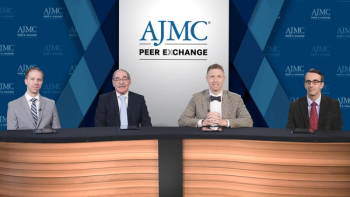
Advancing IgA Nephropathy Care: Emerging Therapies, Unmet Needs, and Economic Considerations


Panelists discuss how immunoglobulin A (IgA) nephropathy represents a complex glomerular disease characterized by IgA deposition in the mesangium, with a wide spectrum of clinical presentations ranging from benign hematuria to progressive kidney failure requiring comprehensive management strategies.

Panelists discuss how immunoglobulin A (IgA) nephropathy develops through a complex 4-hit cascade involving aberrant IgA1 glycosylation, anti-glycan antibody formation, immune complex deposition, and inflammatory kidney damage.

Panelists discuss how immunoglobulin A (IgA) nephropathy diagnosis requires kidney biopsy with immunofluorescence showing dominant or codominant IgA deposits in the mesangium, often accompanied by C3 and sometimes IgG or IgM.

Panelists discuss how patients with immunoglobulin A (IgA) nephropathy typically present with microscopic or gross hematuria, often during upper respiratory infections, along with variable proteinuria and sometimes hypertension or decreased kidney function.

Panelists discuss how diagnostic challenges in immunoglobulin A (IgA) nephropathy lead to delayed identification, missed treatment windows, and increased risk of irreversible kidney damage due to the requirement for invasive biopsy, nonspecific symptoms, and variable disease presentation.

Panelists discuss how immunoglobulin A (IgA) nephropathy significantly impacts patients’ quality of life through chronic symptoms, treatment burden, psychological effects, and the looming threat of progressive kidney function decline.

Panelists discuss how immunoglobulin A (IgA) nephropathy treatment has evolved to include supportive care with optimized blood pressure control and renin-angiotensin system blockade as first-line therapy, with increasingly targeted immunomodulatory approaches for higher-risk patients showing persistent proteinuria.

Panelists discuss how current immunoglobulin A (IgA) nephropathy treatments primarily target downstream inflammatory pathways of the 4-hit cascade, with emerging therapies now beginning to address specific upstream mechanisms including abnormal IgA1 production, autoantibody formation, and immune complex deposition.

Panelists discuss how significant gaps in immunoglobulin A (IgA) nephropathy patient care persist, including delayed diagnosis, limited access to nephrology expertise, inadequate disease monitoring, and insufficient psychosocial support throughout the disease journey.

Panelists discuss how novel targeted therapies for immunoglobulin A (IgA) nephropathy are transforming treatment paradigms by specifically addressing the underlying pathophysiology of the 4-hit cascade rather than broadly suppressing inflammation.

Panelists discuss how targeted therapies for immunoglobulin A (IgA) nephropathy are advancing rapidly, with promising results from trials of B-cell modulating agents that inhibit APRIL/BAFF signaling and complement pathway inhibitors that address specific steps in the 4-hit cascade.

Panelists discuss how emerging targeted therapies for immunoglobulin A (IgA) nephropathy address critical gaps in the current treatment landscape by offering disease-modifying potential, improved efficacy for resistant cases, and better safety profiles compared with traditional immunosuppression.

Panelists discuss how treatment sequencing in immunoglobulin A (IgA) nephropathy will likely evolve toward a risk-stratified approach, beginning with optimized supportive care and renin-angiotensin system blockade, then incorporating targeted therapies based on specific disease mechanisms and biomarker profiles before resorting to broader immunosuppression.

Panelists discuss how treatment success in immunoglobulin A (IgA) nephropathy extends beyond clinical trial end points to encompass sustained proteinuria reduction, stable kidney function, symptom improvement, and enhanced quality of life metrics that matter to patients in real-world settings.

Panelists discuss how immunoglobulin A (IgA) nephropathy progression creates escalating economic burdens for patients through direct health care costs, lost productivity, increasing medication needs, and eventually the overwhelming financial impact of dialysis or transplantation.

Panelists discuss how early diagnosis of immunoglobulin A (IgA) nephropathy enables timely interventions that can significantly reduce long-term costs by delaying progression to advanced kidney disease, preventing complications, and minimizing the need for expensive renal replacement therapies.

Panelists discuss how disease-modifying therapies for immunoglobulin A (IgA) nephropathy, though initially more expensive than symptomatic treatments, offer substantial long-term cost benefits by preventing progression to kidney failure and avoiding the enormous expenses of dialysis and transplantation.

Panelists discuss how patient-reported outcomes including symptom burden, treatment-related adverse effects, preserved functionality, and impact on quality of life should be prioritized alongside traditional clinical measures when assessing the value of immunoglobulin A (IgA) nephropathy therapies.

Panelists discuss how step-therapy for immunoglobulin A (IgA) nephropathy is evolving toward a more personalized approach, starting with optimized supportive care before progressing to targeted therapies based on risk stratification, disease characteristics, and biomarker profiles.

Panelists discuss how immunoglobulin A (IgA) nephropathy’s progressive nature and significant economic impact demand a shift in payer perspective toward investing in disease-modifying therapies that, despite higher upfront costs, can prevent the extraordinary expenses of dialysis and transplantation while preserving patients’ quality of life and productivity.

Panelists discuss how economic considerations in immunoglobulin A (IgA) nephropathy medication management vary dramatically across chronic kidney disease (CKD) stages, with early intervention costs being modest but potentially cost-saving compared with the extraordinary expenses of advanced disease management and renal replacement therapy.

Panelists discuss how the management of immunoglobulin A (IgA) nephropathy is undergoing a transformative shift from symptom control to targeted disease modification, with emerging therapies offering new hope for patients while requiring thoughtful integration into clinical practice and health care systems.



